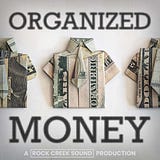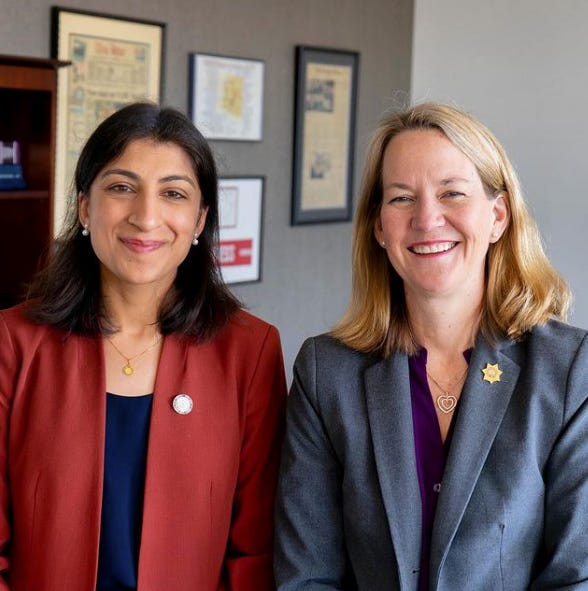Yes, There Are Antitrust Voters in a Swing StateIn Arizona, voters told canvassers they want a crackdown on landlords. And one elected leader - a close ally of Lina Khan - gave it to them. Will it matter today? Is Kris Mayes the future of politics?It’s election day, which means we’re going to hear a lot about trends and voters, but ultimately will have no idea what is happening until vote counts start this evening. One you’ll hear is that the parties are realigning, with the GOP pulling in more black and Latino voters while the Democrats are drawing former Republican women, but we won’t have demographic information for weeks. CNBC, MSNBC, Fox News, CNN, and even Amazon Prime are wall-to-wall with election coverage, trying to strike up a conversation about everything while knowing nothing. So today, I want to offer you a more interesting election-related story that I heard about a few weeks ago, in a state where antitrust might have an impact on voters. It also hints at some of the realigning aspects of politics. It’s so compelling that Dave Dayen and I turned it into a podcast episode on Organized Money (which you can listen to on Apple or Spotify or wherever you get your podcasts.) And I suspect that it hints at the future of the Democratic Party, because it speaks to how certain elected leaders are generating political leverage.
Here’s the story. Earlier this year, Arizona Attorney General Kris Mayes, an ally of Federal Trade Commission Chair Lina Khan, sued large corporate landlords and a software company called RealPage for illegally raising rents in Phoenix and Tucson through a price-fixing conspiracy, hiking the cost of rent by as much as 20%. On BIG, we’ve gone over this case. The gist is that RealPage aggregates a bunch of landlords in a metro area (over 70% of the landlords in Phoenix, for example), gets them to share their prices and occupancy, feeds that into their software and encourages landlords to coordinate specific rent hikes. Mayes called it an illegal price-fixing conspiracy, only with algorithms instead of three CEOs in a back room. Her lawsuit went viral on social media. And what we started to hear was that, when volunteers for candidates from Kamala Harris on down went out to knock on doors in Arizona and rally voters for the election, they kept hearing one thing: “Are you with Kris Mayes? We love that lawsuit she did against RealPage!” Mayes isn’t even on the ballot this year, but voters associated government action with her work trying to stop illegal rent hikes. On Organized Money, Dave and I had a conversation with Mayes about why she brought the suit, the response, and how voters are now bringing it up on the trail, unprompted. Podcasting is the perfect medium for this story, because Mayes is a future Democratic party leader, and someone you should get to know. Her background is equally interesting for what it says about the future of politics. It turns out, Mayes and Khan have a lot in common. Both started out as journalists, both have been scholars and both have a background in thinking about market power. Khan was an investigator of monopolies in Congress, while Mayes actually regulated public utilities as Chair of the Arizona Corporation Commission. They are also both newcomers to the Democrats; while Khan is young, Mayes was a Republican until recently, when she switched parties and ran for the attorney general office, winning the closest election in state history in 2022.
Over the next few weeks, you may hear a lot of chatter about how the parties are realigning, that the GOP is becoming a working class male-dominated party, and the Democrats are moving towards a coalition of affluent females, bringing moderate Republicans into the fold. That may or may not be correct. But one of the assumed implications is that the GOP will ultimately start to address corporate power, and the Democrats will focus on social issues and turn away from populist economics. Here, however, we see a former moderate Republican in Mayes, exactly who you’d think would be the official who represents the realigning Democratic coalition, and yet she’s one of the most aggressive and populist antitrust enforcers in the country outside of Washington, D.C. And that profile is not unusual; the only antitrust lawyer running for Congress is Maggie Goodlander in New Hampshire, and she comes from a moderate Republican family, and even worked as an advisor to former Republican Senator John McCain. (Dave and I also did an episode with Goodlander and a few other Congressional candidates, which you can listen to here.) Mayes and Goodlander are highly successful and capable leaders, and likely future party stars, and they are exactly who big business might think support the status quo of corporate consolidation. Yet, the opposite is the case. In other words, I suspect the idea there’s a large group of voters who love corporate power is a D.C. fairy tale that lobbyists and big business leaders tell themselves. Anyway, listen to our discussion with Mayes about why she sued RealPage, how her views were shaped about corporate power, and what’s happening in the election in this critical swing state. Rent, antitrust, corporate power, and politics, all in one episode. Or you can listen to our episode on Congressional candidates, highlighted by a conversation with Goodlander. Finally, if you really hate paying attention to elections and want to read something that’s purely monopoly-related, I wrote a piece yesterday on how Albertsons uses land use restrictions to kill grocery store rivals in rural areas, with a focus on some ski towns in California. Thanks for reading. Send me tips on weird monopolies, stories I’ve missed, or comments by clicking on the title of this newsletter. And if you liked this issue of BIG, you can sign up here for more issues of BIG, a newsletter on how to restore fair commerce, innovation and democracy. If you really liked it, read my book, Goliath: The 100-Year War Between Monopoly Power and Democracy. cheers, Matt Stoller This is a free post of BIG by Matt Stoller. If you liked it, please sign up to support this newsletter so I can do in-depth writing that holds power to account. |


